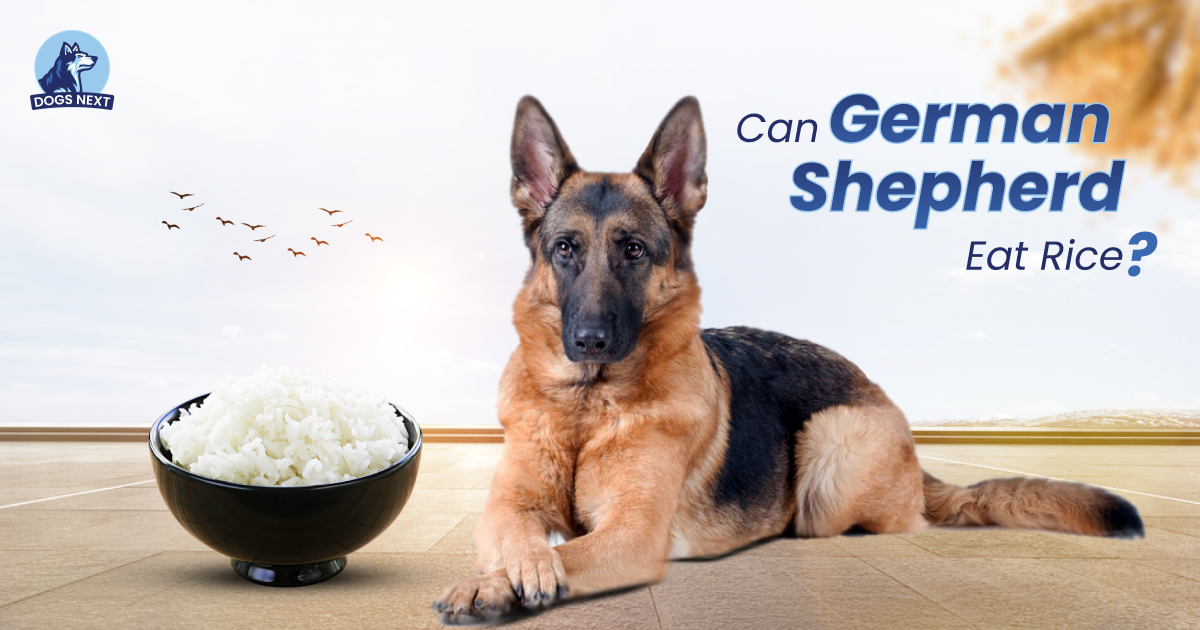Yes, German Shepherds can eat rice, and it is commonly included in their diet. Rice is a good source of carbohydrates and can be a healthy addition to their meals when prepared and served properly.
Rice is a staple food in many parts of the world, and it’s natural to wonder if it’s suitable for your furry friend. In this article, we’ll explore the benefits and risks of feeding rice to German Shepherds and provide you with a comprehensive guide on the proper way to do it.
Table of Contents
What Happens If My German Shepherd Eats Rice?
If your German Shepherd eats rice in moderation and properly cooked, it can be a healthy addition to their diet. In fact, rice is a great source of carbohydrates and can provide essential nutrients such as fiber and minerals to your dog.
However, feeding your German Shepherd too much rice or improperly cooked rice can lead to digestive issues such as diarrhea, bloating, and gas. This is because dogs have a limited ability to digest complex carbohydrates like rice, and feeding them too much can overload their digestive system.
Additionally, it’s important to note that some dogs may be allergic or sensitive to rice, so it’s crucial to monitor your dog’s reaction after feeding them rice for the first time. If you notice any adverse reactions such as itching, rashes, or vomiting, you should stop feeding them rice and consult with a veterinarian.
Nutritional Needs of German Shepherds
As a large and active breed, they require a balanced diet that is rich in high-quality protein, healthy fats, and complex carbohydrates.
Protein is an essential nutrient for German Shepherds as it helps support muscle growth and repair, which is especially important for an active breed like the German Shepherd. They require a minimum of 22% protein in their diet to maintain their health and meet their energy needs.
Fats are also crucial for German Shepherds as they provide a concentrated source of energy and help maintain healthy skin and coats. However, it’s important to choose healthy sources of fat, such as fish oil or chicken fat, and avoid feeding them excessive amounts of saturated fat.
Carbohydrates are another important nutrient for German Shepherds as they provide a source of energy and help support digestion. Rice is a great source of complex carbohydrates that can provide sustained energy to your dog. However, it’s important to choose the right type of rice and cook it properly to avoid digestive issues.
Rice and Its Benefits for German Shepherds
Rice is a popular and nutritious food that can be beneficial for German Shepherds in many ways. Here are some of the benefits of feeding rice to your furry friend:
Provides carbohydrates: Rice is an excellent source of complex carbohydrates that can provide energy to your German Shepherd. These carbohydrates are slowly digested, which means they provide sustained energy to your dog throughout the day.
Contains essential nutrients: Rice is rich in essential nutrients such as fiber, vitamins, and minerals that are beneficial for your dog’s health. These nutrients can help support their immune system, promote healthy digestion, and maintain a healthy weight.
Gluten-free: Rice is a gluten-free grain, which makes it an ideal choice for dogs with food sensitivities or allergies. It’s also a great alternative to wheat-based dog foods that can cause digestive issues in some dogs.
Promotes healthy digestion: Rice is rich in fiber, which can help improve digestion in dogs. It can also help regulate bowel movements and prevent constipation.
Easily digestible: Rice is a highly digestible food that is easy on your dog’s digestive system. This makes it a great option for dogs with sensitive stomachs or those recovering from an illness.
How to Include Rice in a German Shepherd’s Diet
Here’s how to include rice in a German Shepherd’s diet:
Choose the right type of rice
Brown rice or white rice are both suitable for dogs. However, brown rice is more nutritious as it contains more fiber and vitamins compared to white rice.
Cook the rice properly
Properly cooked rice is essential to avoid any digestive issues in your dog. Always cook rice in plenty of water until it’s fully cooked and soft. Avoid using seasonings or additives that may be harmful to your dog.
Introduce rice slowly
If your German Shepherd has not had rice before, it’s best to introduce it slowly to avoid any digestive issues. Start with a small amount and gradually increase the serving size over a few days.
Recommended serving size and frequency
The recommended serving size of rice for a German Shepherd is 1-1.5 cups per day, depending on their weight and activity level. It’s best to serve rice as a part of their meal and not as a substitute for their regular food. Rice can be included in their diet once or twice a week.
Monitor your dog’s reaction
It’s important to monitor your dog’s reaction after feeding them rice for the first time. If you notice any adverse reactions such as diarrhea, vomiting, or stomach upset, you should stop feeding them rice and consult with a veterinarian.
By following these guidelines, you can safely include rice in your German Shepherd’s diet and provide them with the necessary nutrition to keep them healthy and happy.
Is My German Shepherd Puppy Can Eat Rice?
If you’re a new owner of a German Shepherd puppy, you may be wondering if it’s safe to feed them rice. Here’s what you need to know:
Age of the puppy
Generally, puppies can start eating solid food around three to four weeks of age. However, it’s important to wait until they’re at least eight weeks old before introducing them to new foods like rice.
Choose the right type of rice
Just like with adult dogs, it’s important to choose the right type of rice for your German Shepherd puppy. Brown rice is more nutritious than white rice and is a better option.
Introduce rice slowly
As with any new food, it’s important to introduce rice to your puppy’s diet slowly to avoid any digestive issues. Start with a small amount and gradually increase the serving size over a few days.
Monitor your puppy’s reaction
It’s important to monitor your puppy’s reaction after feeding them rice for the first time. If you notice any adverse reactions such as diarrhea, vomiting, or stomach upset, you should stop feeding them rice and consult with a veterinarian.
Serving size and frequency
The recommended serving size of rice for a German Shepherd puppy is smaller than that of an adult dog. A good rule of thumb is to feed them about a quarter to half a cup of cooked rice per day. Rice can be included in their diet once or twice a week.
Overall, rice can be a safe and nutritious addition to your German Shepherd puppy’s diet if introduced properly and in moderation.
Frequently Asked Questions
Q: Is cooked rice good for German Shepherds?
Ans: Yes, cooked rice is a good source of carbohydrates and can be a part of a balanced diet for German Shepherds. However, it’s important to choose the right type of rice and serve it in the appropriate portion to avoid any digestive issues.
Q: Can I feed my dog rice every day?
Ans: While rice is a healthy food for German Shepherds, it’s not recommended to feed your dog rice every day. Your German Shepherd needs a balanced diet that includes a variety of foods to provide all the necessary nutrients. Consult with your veterinarian to develop a meal plan that meets your German Shepherd’s specific needs.
Q: Are chicken and rice good for a German Shepherd?
Ans: Yes, chicken and rice can be a good meal for German Shepherds. Chicken is an excellent source of protein for GSD, while rice provides carbohydrates and other essential nutrients.
Conclusion
German Shepherds can eat rice as a part of their balanced diet. Rice provides essential nutrients, such as carbohydrates, vitamins, and minerals, which can help your furry friend stay healthy and active. However, it’s crucial to choose the right type of rice and serve it in the appropriate portion to avoid any digestive issues.
As always, consult with your veterinarian if you have any concerns about your German Shepherd’s diet or health. By providing a balanced diet, you can ensure that your loyal companion will lead a happy and healthy life.
Thanks for reading and good luck!

I’m David, an expert contributor and writer, with two furry friends of my own, I know the challenges of raising and caring for dogs. From training to nutrition and health, my goal is to provide valuable insights and advice to help create strong bonds and happy, healthy lives. Find me in Twitter.




